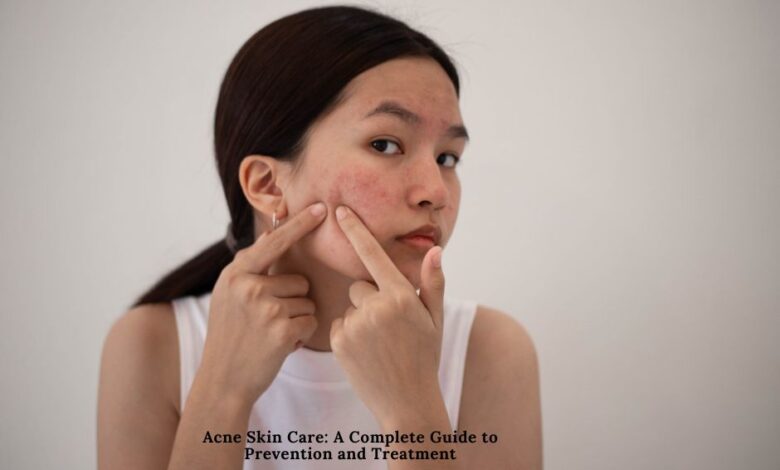
Acne is a common skin condition that affects millions of people worldwide. Characterized by pimples, blackheads, whiteheads, redness, and sometimes cysts, acne can significantly impact your appearance and confidence. While some may dismiss acne as a minor issue, proper acne skin care is essential for maintaining healthy skin and preventing long-term damage. This guide will walk you through effective acne skin care practices, from prevention to treatment, to help you achieve clear, radiant skin.
What is Acne?
Acne is a skin condition that occurs when hair follicles become clogged with oil and dead skin cells. This leads to the growth of bacteria, resulting in inflammation and the formation of pimples, blackheads, and cysts. Acne can appear on the face, back, chest, and other areas of the body, causing both physical discomfort and emotional distress.
Why Acne Skin Care Matters
Acne skin care is not just about treating existing breakouts—it’s about preventing them from occurring in the first place. A proactive approach to acne skin care can help you maintain clear skin and avoid the complications of severe acne, such as scarring and hyperpigmentation.
Daily Acne Skin Care Routine
A consistent and disciplined skin care routine is the foundation of effective acne prevention and treatment. Here’s how you can incorporate acne skin care into your daily life:
1. Cleanliness is Key
- Morning and Night Showers: Keeping your skin clean is the most basic yet crucial step in acne skin care. Showering in the morning helps remove sweat and oil accumulated overnight, while a night shower can relax your body and prepare you for a good night’s sleep.
- Post-Activity Showers: If you live in a hot or humid climate or engage in activities that cause excessive sweating, showering immediately afterward is a must. This prevents sweat and oil from clogging your pores.
2. Choose the Right Cleanser
- Use a mild, water-soluble, oil-free, and soap-free cleanser to wash your face, neck, and arms. Cleansing removes dirt, pollutants, and excess oil, reducing the likelihood of acne.
- Avoid harsh scrubs or cleansers that can irritate the skin and worsen acne.
3. Remove Makeup Before Bed
- Never sleep with makeup on. Use a gentle makeup remover to cleanse your face thoroughly before bedtime. This prevents makeup residue from clogging pores and causing breakouts.
4. Wear Clean Clothes and Use Clean Bedding
- Tight clothing can trap sweat and oil, leading to acne. Opt for soft, breathable cotton fabrics to minimize irritation.
- Regularly wash your clothes, pillowcases, and makeup brushes to prevent the buildup of bacteria and oil.
Acne Skin Care for Existing Breakouts
If you already have acne, it’s important to handle it with care to avoid scarring and further irritation.
1. Avoid Touching or Squeezing Pimples
- Picking or squeezing acne can lead to permanent scars and spread bacteria to other areas of your skin.
2. Use Over-the-Counter (OTC) Treatments
- Benzoyl Peroxide: Kills acne-causing bacteria and reduces inflammation.
- Salicylic Acid: Exfoliates the skin and unclogs pores.
- Acne Creams and Lotions: Look for non-comedogenic products that won’t clog pores.
3. Be Gentle with Your Skin
- Cleanse the affected area with a soft cotton pad and avoid harsh scrubbing.
- Pat your skin dry instead of rubbing it to prevent irritation.
When to See a Dermatologist
If your acne persists despite following a consistent skin care routine and using OTC treatments, it’s time to consult a dermatologist. They can provide:
- Prescription Medications: Topical retinoids, antibiotics, or hormonal treatments.
- Professional Procedures: Chemical peels, laser therapy, or extractions for severe acne.
Preventive Acne Skin Care Tips
- Stay Hydrated: Drink plenty of water to keep your skin hydrated and healthy.
- Eat a Balanced Diet: Limit sugary and processed foods, which can trigger acne.
- Manage Stress: High stress levels can worsen acne, so practice relaxation techniques like yoga or meditation.
- Avoid Heavy Makeup: Opt for non-comedogenic or oil-free makeup products.
Conclusion
Acne skin care is not just about treating breakouts—it’s about adopting a proactive approach to maintain healthy, clear skin. By following a disciplined skin care routine, using the right products, and seeking professional help when needed, you can effectively manage acne and prevent future breakouts. Remember, consistency and patience are key to achieving long-term results.



